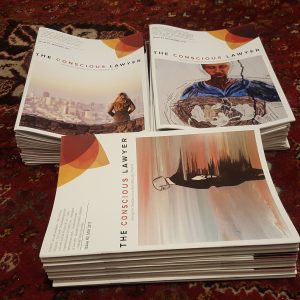Elaine Quinn is the editor of The Conscious Lawyer, a professional magazine and website devoted to positive, socially aware developments in legal practice and thinking. Elaine has also contributed thought provoking, in-depth book reviews on this Justice Conversation website. I asked Elaine if she would be willing to share with us some of her experiences in the founding and development of her magazine. Here’s what she had to say:
 First, let’s give our readers a sense of what The Conscious Lawyer is. Can you describe the overall concept?
First, let’s give our readers a sense of what The Conscious Lawyer is. Can you describe the overall concept?
In simple terms, The Conscious Lawyer is for lawyers*, (*when I use the term lawyers, I mean anyone working or studying within the field of law) that are interested in using the instrument of law for good. This is a desire to do good that arises from the realization that we are all deeply interconnected. It seems to be a shift in consciousness that is happening more rapidly these days and is radically changing our understanding of the implications of doing harm. When we do harm to another being, we also do harm to ourselves, individually and collectively. Unfortunately the law often does more harm than good – for the planet and for the beings living on it. Many lawyers* are awakening to this realization and the magazine is a forum to express and share these views which are clearly so important at this time. It currently deals with a broad range of topics reflecting the broad spectrum of emerging practice areas from animal law to earth law to holistic wills to therapeutic jurisprudence.
When did you start creating The Conscious Lawyer, and how did that come about? Was it difficult to put the first issue together?
Like many others, through a sustained practice of meditation over time, my perception and understanding of the world around me started to shift. It started to become unmistakably clear how interconnected we all are. I realized how important it was to be having a positive impact with my actions. If we all live in this deeply connected ecosystem together we need to be considerate of each other and of the planet in our actions. This understanding was not really present during my education – in fact, the underlying message was that to survive and thrive we need to focus on our individual needs and desires.
As a lawyer, this inevitably led to a questioning of my actions at work. Unfortunately I could see, and perhaps more importantly feel, many ways in which I was not contributing to the wellbeing of the world around me despite my best intentions. So I became interested in exploring ways to change that and to change direction.
I had quickly developed specializations in litigation, commercial law, insurance law and media law – not typically practice areas that lend themselves to genuine service (for example, the way environmental law and human rights law might). Initially, I began postgraduate studies in mindfulness and law but, though interesting and worthwhile, it did not feel like the right time to pursue those studies.
 The idea for the first edition came in the summer of 2016 and it followed with a Skype call to J. Kim Wright, a long-time advocate and leader in the Integrative Law Movement and one of the only “conscious lawyers” I knew at the time! Kim was hugely supportive from the beginning and suggested several contacts many of whom ended up being contributors to the first edition. Everyone I contacted was enthused and supportive about the idea and the first edition came together easily. I also had the help of a talented graphic designer who works with ethical and sustainable businesses so, while it was a significant amount of work, the whole process was exciting.
The idea for the first edition came in the summer of 2016 and it followed with a Skype call to J. Kim Wright, a long-time advocate and leader in the Integrative Law Movement and one of the only “conscious lawyers” I knew at the time! Kim was hugely supportive from the beginning and suggested several contacts many of whom ended up being contributors to the first edition. Everyone I contacted was enthused and supportive about the idea and the first edition came together easily. I also had the help of a talented graphic designer who works with ethical and sustainable businesses so, while it was a significant amount of work, the whole process was exciting.
How do you gather or select the writers and topics?
There is no system. From the beginning this magazine was an experiment. The process of gathering contributions has, to date, been easy and organic. Either people will approach me or someone will recommend the name of someone to contact. I have enjoyed not being too prescriptive about it. There has been a great diversity of articles and themes in every edition. If anyone reading this article feels they have a piece of writing or art or poetry they would like to contribute please do email me at: elaine@theconsciouslawyer.co.uk.
What was something that you learned while working on this that surprised you?
The extent of the movement. As lawyers*, we may feel alone when we start to sense these seeds of change within us – the type of change that is usually rooted in feelings of interconnectedness, empathy and compassion for those around us or perhaps feelings of anger and frustration at the way things currently operate. We may be working in a law practice that feels very constraining, rigid and unconducive to expressing these new ways of thinking and being. These seeds of change need to be nourished and one of the ways to do that is through community and connection. The realization that we are not alone and that there are hundreds and thousands of lawyers* around the world sharing a similar transformative worldview and changing their practice is powerful and exciting. I hope the magazine can support lawyers* with that shift in some way.
Have you published articles that have changed your own point of view about something? Which articles have broadened your own consciousness the most?
The most enjoyable part of the process for me has been conducting interviews and writing book reviews. A book reviewed for the most recent edition ha d a significant impact on me. “The Desire for Mutual Recognition – Social Movements and the Dissolution of the False Self“ by Peter Gabel articulates in a beautiful way the dilemma we face in not having consistent access to our true, authentic selves and how that has a profound impact on our collective reality. My understanding of how the separation from our natural, radiant, joyful selves manifests after birth, and then through our assimilation into the world, really deepened. The joy of doing a book review is that you have the opportunity to read a book slowly and carefully over a period of months and digest its message. The book review is available here for anyone that may be interested.
d a significant impact on me. “The Desire for Mutual Recognition – Social Movements and the Dissolution of the False Self“ by Peter Gabel articulates in a beautiful way the dilemma we face in not having consistent access to our true, authentic selves and how that has a profound impact on our collective reality. My understanding of how the separation from our natural, radiant, joyful selves manifests after birth, and then through our assimilation into the world, really deepened. The joy of doing a book review is that you have the opportunity to read a book slowly and carefully over a period of months and digest its message. The book review is available here for anyone that may be interested.
What do you see is the role of personal inner transformation or growth in legal practice?
I will answer this with a reference to the Institute of Sacred Activism, an international organization founded by Andrew Harvey which is focused on inviting people to take up the challenge of our contemporary global crises by “becoming inspired, effective, and practical agents of institutional and systemic change, in order to create peace and sustainability”.
He says that Sacred Activism is “a transforming force of compassion-in-action that is born of a fusion of deep spiritual knowledge, courage, love, and passion, with wise radical action in the world.” Our legal systems need sacred activists, and many of the contributors to the magazine are taking up that role in some way.
 For me, personal inner transformation or growth falls within the idea of “sacred” however that may be interpreted by us. Otherwise, we are at risk of being activists without the simultaneous deep inner transformation. Inevitably, we will fall more heavily on one or other side of the description but I do think that to effect the most powerful change we need to work on developing both of these aspects.
For me, personal inner transformation or growth falls within the idea of “sacred” however that may be interpreted by us. Otherwise, we are at risk of being activists without the simultaneous deep inner transformation. Inevitably, we will fall more heavily on one or other side of the description but I do think that to effect the most powerful change we need to work on developing both of these aspects.
I know that although you are based in the UK, you have readers and contributors in your country as well as in the US and elsewhere. Can you speak about some of the similarities or differences you’ve come across in sharing conscious law with professionals in different regions?
For the second edition, I reviewed a book called “Transforming Justice, Lawyers and the Practice of Law“ by Professor Marjorie Silver. I recall for that review one of the points I made was that this was not a book about the content of black-letter law. It was a book about how our core assumptions of reality influence the way our legal and justice systems are set up and how those core assumptions are radically changing. I think this directly answers this question. Our various legal systems around the world have become highly differentiated and complicated over centuries of development. What we are talking about here, and in the magazine, is going back to the basics. What does it mean to be human today and in relationship with each other and the planet? And how is the law supporting, or suppressing, that? These are questions that transcend boundaries. The book review is available here for anyone that may be interested.
When I read articles in your magazine, I feel a great resonance with the work I’m doing with Justice Conversation. One of my core concepts is that love is the foundation of justice, that is in order for law to achieve just outcomes, lawyers have to be able to practice law in a way that’s rooted in love. Can you talk about how you understand conscious lawyering, and whether that has anything to do with love?
Language can often be limiting because we all have different understandings of what words – particularly emotive words like love – mean and represent. Also, words and language have such a strong hold of us in law.
Having said that, an Irish poet and philosopher John O’Donohue says this about love: “When love awakens in your life, in the night of your heart, it is like the dawn breaking within you. Where before there was anonymity, now there is intimacy; where before there was fear, now there is courage; where before in your life there was awkwardness, now there is a rhythm of grace and gracefulness; where before you used to be jagged, now you are elegant and in rhythm with your self. When love awakens in your life, it is like a rebirth, a new beginning.” (Anam Cara: A book of Celtic Wisdom).

Elaine Quinn, Editor and founder of The Conscious Lawyer.
The awakening of love as O’Donohue describes it, I sense, is precisely what many of us in the legal system are starting to experience and embody. I imagine it may also be close to the idea of love that you speak of. Having justice systems infused with this type of love is an incredible idea and one that we should continue to courageously aspire to. It is brilliant that you are contributing to this idea with your art and your Justice Conversation initiative.
*when I use the term lawyers, I mean anyone working or studying within the field of law.